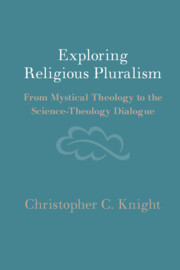Book contents
- Exploring Religious Pluralism
- Exploring Religious Pluralism
- Copyright page
- Epigraph
- Contents
- 1 Introduction
- 2 Apophaticism and Perennialism
- 3 The Philosophy of Religion and Its Limitations
- 4 Philosophy and Noetic Perception
- 5 Philosophy and the Pluralistic Hypothesis
- 6 Beyond Philosophical Argument
- 7 Archetypes and ‘Platonic’ Mysticism
- 8 Noetic Perception and the Role of the Imagination
- 9 The Evolution of Religiosity
- 10 Revelation and Divine Action
- 11 A Pluralistic Model in the Making
- 12 Pluralism or ‘Reciprocal Inclusivism’?
- Afterword
- Bibliography
- Index
8 - Noetic Perception and the Role of the Imagination
Published online by Cambridge University Press: 14 March 2024
- Exploring Religious Pluralism
- Exploring Religious Pluralism
- Copyright page
- Epigraph
- Contents
- 1 Introduction
- 2 Apophaticism and Perennialism
- 3 The Philosophy of Religion and Its Limitations
- 4 Philosophy and Noetic Perception
- 5 Philosophy and the Pluralistic Hypothesis
- 6 Beyond Philosophical Argument
- 7 Archetypes and ‘Platonic’ Mysticism
- 8 Noetic Perception and the Role of the Imagination
- 9 The Evolution of Religiosity
- 10 Revelation and Divine Action
- 11 A Pluralistic Model in the Making
- 12 Pluralism or ‘Reciprocal Inclusivism’?
- Afterword
- Bibliography
- Index
Summary
The notion of noetic perception may be expanded in relation to the role of the imagination in revelatory experience. Here, the expansion of neo-Platonic perspectives in the understanding of Samuel Taylor Coleridge is significant, as are the notion of the imaginal developed by Henry Corbin and the understanding of the role of the human imaginative faculty in religious visionary experience, as explored by Karl Rahner and Hans Urs von Balthasar. This kind of analysis has implications for solving certain puzzles inherent in the New Testament accounts of visions of the risen Christ. However, questions arise in relation to this understanding, and these may be tackled in part through recent Christian thinking about the notion of revelation, in which the focus is no longer on ‘information about God’ but on what Yves Congar has called an orientation towards salvation. This suggests an understanding akin to the perennialist separation of exoteric and esoteric aspects of religious traditions in the sense of suggesting a two-component, psychological-referential model of revelatory experience.
Keywords
- Type
- Chapter
- Information
- Exploring Religious PluralismFrom Mystical Theology to the Science-Theology Dialogue, pp. 118 - 134Publisher: Cambridge University PressPrint publication year: 2024

